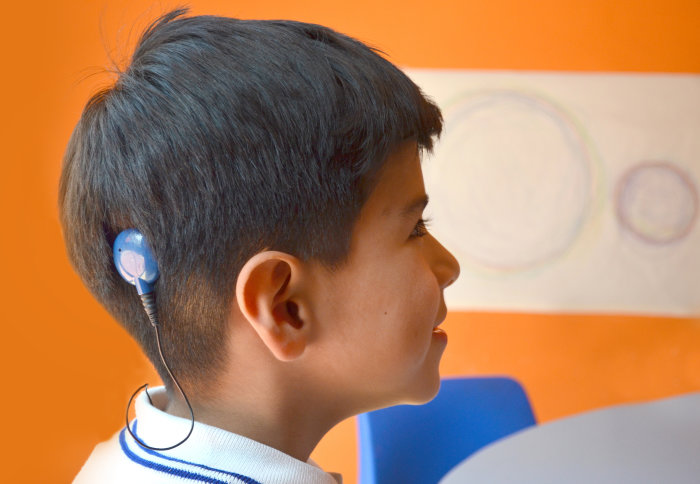UK urged to lead brain-machine interface technology by Imperial-led report

Cochlear implants are a type of neural interface
A Royal Society report, led by Imperial experts, has urged the UK Government to take the lead on tech that merges brain, body and machine.
The report, part of a new perspective on this emerging technology and published by the Royal Society, argues that the UK government should launch a national investigation into neural interface technologies – devices that “blur the lines between mind and machine” – and their ethical implications.
This, the report says, would help position the UK as leaders in the technology to help ethically develop it for use in medicine and human interaction.
The applications for neural interfaces are as unimaginable today as the smartphone was a few decades ago...However, if developments are dictated by a handful of companies then less commercial applications could be side-lined. Professor Chris Toumazou Department of Electrical and Electronic Engineering
Neural interfaces are devices implanted in the body, or worn externally, that can record or stimulate activity in the brain and nervous system.
Examples include cochlear implants, which convert sound into electrical signals sent directly to patients’ brains, and prosthetic arms or legs that move based solely on human thought.
Experts predict this emerging technology could eventually be applied to conditions like dementia, paralysis, mental health issues, and obesity.
The report’s authors, co-chaired by Imperial College London’s Professor Chris Toumazou and Dr Tim Constandinou, outline how neural interfaces could transform medicine and human interaction in the coming decades.
External and internal neural interfaces are already being used in medical conditions, from stroke rehabilitation to epilepsy. Commercial products promising better appetite control or improved sleep and focus are already a reality.
There are no internally implanted interfaces licensed outside of medicine, but the report says this might soon be a reality.
Professor Toumazou, of Imperial’s Department of Electrical and Electronic Engineering, said: “The applications for neural interfaces are as unimaginable today as the smartphone was a few decades ago. They could bring huge economic benefits to the UK and transform sectors like the NHS, public health and social care.
"However, if developments are dictated by a handful of companies then less commercial applications could be side-lined.
“That is why we are calling on the government to launch a national investigation into this emerging field, to identify the UK’s priorities and let the public help shape how the technology develops and where we want it to take us.”
Benefiting humanity
By 2040, neural interfaces are likely to be an established option to help people walk after paralysis and tackle treatment-resistant depression, and they may even have made treating Alzheimer’s disease a reality. Dr Tim Constandinou Department of Electrical and Electronic Engineering
The report, called “iHuman: blurring lines between mind and machine” is the first piece of work to explore the ethical questions in depth, and is also the first to propose concrete actions – including suggesting ministers should act swiftly to understand the ethical risks and ensure regulations are fit to make the UK a global leader in the field.
To do this, researchers say government should be aware of the ethics surrounding the issue, to help stimulate innovation and allow the public to help shape the field – rather than it be led solely by for-profit companies.
Dr Constandinou, also from Imperial’s Department of Electrical and Electronic Engineering, said: “By 2040, neural interfaces are likely to be an established option to help people walk after paralysis, and to tackle treatment-resistant depression. They might even have made treating Alzheimer’s disease a reality.
“While advances like seamless brain-to-computer communication seem a much more distant possibility, we should act now to ensure our ethical and regulatory safeguards are flexible enough for any future development.
“In this way we can guarantee these emerging technologies are implemented safely and for the benefit of humanity.”
Act now
The report recommends:
- A ‘national investigation’ of the ethical issues presented by neural interfaces, to address questions of what data should be collected, how it is kept safe, and the acceptability of enhancements.
- Ministers work with industry and universities to create a UK Neural Interface Ecosystem which encourages innovation and collaboration in this field.
- Government and the UK’s Medicines and Healthcare Products Regulatory Authority should trial new ways of encouraging innovation to prevent a monopoly by “Big Tech” firms. This could include a “sandbox” approach for new medical devices to demonstrate their safety and efficacy in a controlled environment.
- Giving the public a clear voice in shaping how this technology is used and regulated for the public good and opting citizens out of having their neural data shared as a default.
We should act now to ensure our ethical and regulatory safeguards are flexible enough...In this way we can guarantee these emerging technologies are implemented safely and for the benefit of humanity. Dr Tim Constandinou Department of Electrical and Electronic Engineering
A public dialogue exercise led by the Royal Society found strong support for neural interfaces in situations where they enable patients to recover something that has been lost due to injury or a medical condition; but less support for the technology when it is used to enhance functions such as memory, concentration or physical skills among healthy people.
The report is published alongside a series of white papers, a separate report on public engagement, and a toolkit of resources.
It was launched on 10 September 2019 at the Royal Society.
This story was adapted from a press release by the Royal Society.
Article supporters
Article text (excluding photos or graphics) © Imperial College London.
Photos and graphics subject to third party copyright used with permission or © Imperial College London.
Reporter
Caroline Brogan
Communications Division